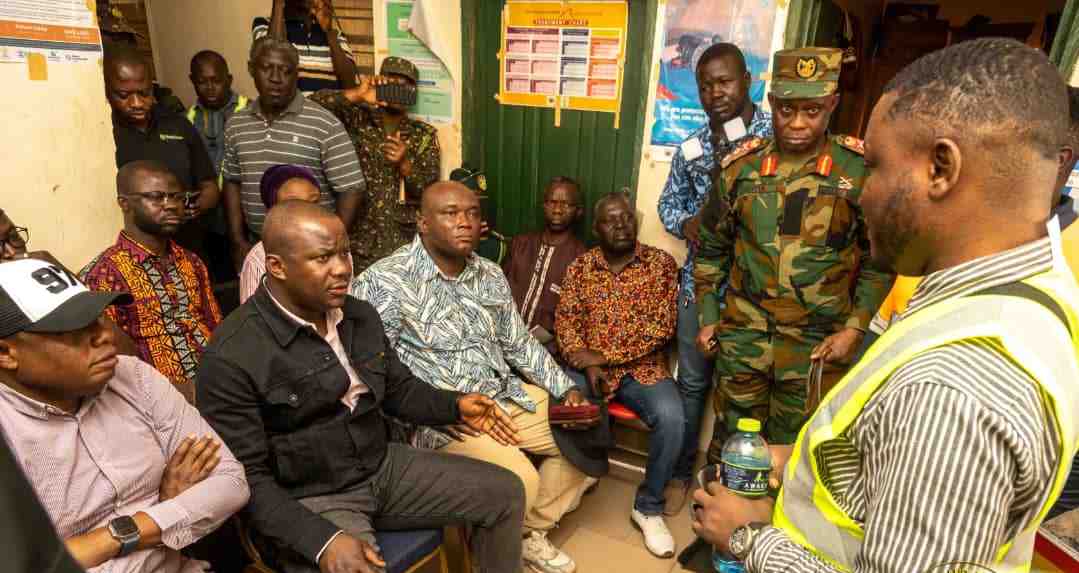The Ghana Boundary Commission (GhBC) has conducted a boundary inspection exercise of the Dollar Power area, with representatives of various stakeholder Ghanaian Ministries, to inspect the state of boundary pillars.
The inspection exercise on Wednesday 31 January 2024, had other objectives of examining the depth of illegal mining activities in the area, as well as progress made on the feeder road being constructed from Ntreaso to Dollar Power.
The GhBC first visited Dollar Power in 2021, during a joint Ghana/Côte d’Ivoire assessment of the International Boundary pillars that demarcate the two countries – an assessment which revealed that there were boundary pillars that had been displaced as a result of illegal mining.

Dollar Power and adjoining communities – located within the Bui Wildlife Protection Zone which is designated as a Forest Reserve – on both sides of the boundary line, are actively engaged in extensive small scale illegal mining, due to the high deposits of rock surface gold along the boundary area.
A 24-Kilometre feeder road from Ntreaso to Dollar Power is under construction, following a report submitted by the GhBC, after its first visit to Dollar Power in 2021, where it observed the inaccessible nature of the community, and noted in a report.
The road is being constructed by Ghana’s Ministry of Roads and Highways with 48 Engineers Regiment of the Ghana Army as Contractor, and upon completion, would help with regular inspection of the International Boundary Line, and aid security agencies to get easy access to the area.

BACKGROUND
Ghana and la Côte d’Ivoire have over the past years benefitted from good bilateral diplomatic relations, since both countries attained independence, with the International Boundary Line between the two countries being established in 1928 by Great Britain and France.
The Boundary Pillars were constructed and mutually positioned by Ghana and la Côte d’Ivoire to officially demarcate the boundary to avoid any dispute, and in 1973, the two countries conducted a joint demarcation exercise, constructing Boundary Pillars and Teak Trees along the International Boundary Line, to reinforce the existing Boundary Pillars, after which citizens from both countries have since respected the boundary demarcation, and lived peacefully.
The Bole District of the Savannah Region of Ghana, shares a common boundary with the Zanzan Province of Côte d’Ivoire along the International Boundary Line, and is the nearest district capital, located 20 Kilometers (km) from the International Boundary Line.

Since 2008, small groups of Ghanaians from various parts of the country have settled and created a small community along the Black Volta, approximately 1km to 5km from the International Boundary Line.
One such community is Dollar Power – formerly known as Sindi Community, which has been in existence for a long time just like any other town in modern Ghana, but lost its inhabitants through invasion by slave raiders in 1897, following which the land was used for farming by Ivorian farmers and herdsmen.
The Dollar Power community was established in 2005 by a businessman named Mr Mohammed Seidu (aka Dollar Power) and his team, after realizing that Ivorian rebels controlled the area and were mining gold on the land. There are three communities in the Sindi area namely, Dollar Power, Dablaka, and Dollar Power Accra.
Recognizing that the land is in Ghana and belongs to the Gonja clan, Mr Mohammed and his team stopped the Ivorian rebels from coming to the area to mine.
Present at the exercise were Mr Samuel Abu Jinapor – Ghana’s Minister for Lands and Natural Resources and Member of Parliament (MP) for Damongo; Mr Benito Owusu-Bio – Deputy Minister, Lands and Natural Resources, and MP for Atwima-Nwabiagya North; Mr Stephen Jalulah – Deputy Minister for Roads and Highways, and MP for Pru West;
The rest were Mr Saeed Muhazu Jibril – Savannah Regional Minister; Major General Emmanuel Kotia – Commissioner General of the GhBC; Madam Veronica Alele Heming – Bole District Chief Executive; members of the Savannah Regional Security Council; and staff of the sector Ministries, and of the GhBC.
Credit: GhBC PR
